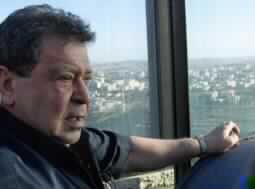HIGHLIGHTS: Sharon's Openness to Declaration Hinges on What he calls 'Cessation of Violence & Terror"||Powell-Bush Conflicting Statements Explained||Occupation Army Sources Say Decision to Dismantle Isolated Israeli Settlements Already Taken-Question Now is 'When?'|| STORY: Israeli Prime Minister Ariel Sharon indicated to US President George W. Bush at their meeting this week that he is open to the idea of a declaration of Palestinian statehood preceding negotiations and agreement on final status issues like borders and Jerusalem, according to a diplomatic source briefed on the White House meeting.
"Not immediately of course. First there needs to be a cessation of violence and terror," the source added.
POWELL-BUSH CONFLICTING STATEMENTS EXPLAINED
Though the United States and Israel are at odds over who would be an acceptable leader of such a state, Sharon's apparent openness to the general proposal promoted by Foreign Minister Shimon Peres, as well as Arab leaders including Egyptian President Hosni Mubarak may serve as an opening for diplomatic progress.
It may too have been what prompted Secretary of State Colin Powell to tell the Arabic-language daily Al Hayat that Bush knows a "temporary state" might have to be set up as a "transitional step" toward permanent Palestinian statehood.
A US official said Powell was expressing the idea of an "interim" or "provisional" state, "the concept being that a government would be formed and declared, but territory, capital, and other final status issues would be determined in continued discussions with the Israelis."
"It isn't all that new and revolutionary a suggestion," Powell told reporters as he flew to a meeting of the G-8 foreign ministers in Canada yesterday. "It's been a pretty consistent element in all of the discussions about how to move forward in the Middle East."
"I said these are the ideas that are out there," he added. "I'm just trying to lay out to you the range of ideas that are out there, the issues that the president is examining."
Whereas Bush also played down the significance of Palestinian Authority Chairman Yasser Arafat, Powell in the interview reaffirmed that the US, including Bush, continues to recognize him as the elected leader of the Palestinian people. Powell said the Bush administration was "not in line" with Sharon's view "that we should not work with Chairman Arafat."
A senior Israeli official had cautioned after Sharon's meeting with Bush that Arafat was "not immune" from any Israeli action.
BUSH STILL UNDECIDED
At the White House, press secretary Ari Fleischer said Bush had not yet signed on to the idea of provisional statehood, and described Powell's comments as "reflective of a variety of pieces of advice that people in the government are paid to listen to, from whatever source they originally derive." A clearer vision of the administration's plans is expected in the coming days, possibly next week, he said.
Bush intends to meet with Saudi Foreign Minister Prince Saud al-Faisal at the White House Thursday for consultations. The Saudis, disturbed by the outpouring of sympathy for Sharon's stance by Bush on Monday, have dispatched Prince Saud to ensure that their views are still being given adequate attention.
In the war for influence, Sharon left behind in Washington two top aides, Dov Weisglass, his bureau chief, and Brig.-Gen. Moshe Kaplinsky, his secretary for military affairs, so that they could consult with US officials after Prince Saud's meeting and ensure that "any presidential statement is acceptable to us," one Israeli official said.
At least one meeting of the Principals' Committee, a grouping of the president's senior advisers, is expected today or tomorrow to discuss the conflicting advice the White House has received, and work to formulate a coherent Middle East policy.
DECISION TO DISMANTLE ISOLATED SETTLEMENTS ALREADY TAKEN
A Senior Israeli occupation army official, said that a decision to dismantle a number of illegal settlement outposts in the West Ban was made at a meeting Wednesday between Defense Minister Binyamin Ben-Eliezer and occupation army commanders. (Read photo caption)
However, they postponed a decision as to when such a step would be taken, pending a review to determine which of the outposts erected since 1995 are illegal, or not government authorized.
According to media reports, as many as 60 such makeshift communities of trailers and tents have been set up throughout the West Bank in the last seven years.
The commanders reportedly discussed the removal of dozens of the isolated hilltop encampments, reportedly due to concern about their vulnerability to Resistance attacks.
Unconfirmed reports say there were plans to start dismantling some of the outposts on Thursday.
The reports added that an encampment at Maon, in the Hebron hills, was expected to be the first place to have mobile homes removed.
PHOTO CAPTION
Israeli Defense Minister Binyamin Ben-Eliezer visits the Jewish Settlement of Psagot, overlooking the West Bank town of Ramallah, background, Wednesday, June 12, 2002. Israeli forces pulled away from Palestinian leader Yasser Arafat's headquarters in Ramallah, witnesses say, ending a siege that lasted more than two days.(AP Photo/ ZOOM 77)
- Author:
& News Agencies - Section:
WORLD HEADLINES


 Home
Home Discover Islam
Discover Islam Quran Recitations
Quran Recitations Lectures
Lectures
 Fatwa
Fatwa Articles
Articles Fiqh
Fiqh E-Books
E-Books Boys & Girls
Boys & Girls  Ramadan
Ramadan Fatwa Audios
Fatwa Audios Month of Mercy
Month of Mercy Women
Women Eed Al- Fitr
Eed Al- Fitr Food Recipes
Food Recipes Videos
Videos

 Prayer Times
Prayer Times












